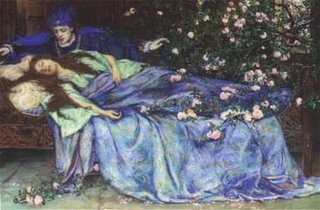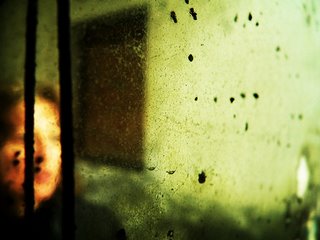
I've been thinking a lot about fairy tales this past week (Western fairy tales, that is). A lot of little things all converging brought it on. Happening upon the excellent film
Finding Neverland on television this past week and watching it again. Reading
this post by Susie Bright about this incredibly cool sounding and beautiful looking graphic novel by Melinda Gebbie and Alan Moore called
The Lost Girls about the adult erotic lives of Alice (post Wonderland), Wendy (post Neverland), and Dorothy (post Oz).
(Aside: Here's what my future husband Neil Gaiman had to say about the book.) And, deciding to re-read one of the favorite novels of my childhood,
A Little Princess by Frances Hodgson Burnett, where the theme of telling fairy stories to oneself to bear the harsh realities of life figures largely into the story.
Anyway, as some of you may remember from older posts, I've have had a very difficult few years of late. For those of you who aren't long-time readers, or for those who are and who don't tend to read between the lines too much, this year I finally acknowledged a sexual assault that happened to me in my childhood and began working through that, and recognizing all the ways it (as well as other things) has affected my life. To get to that point, though, my life pretty much had to go on a downward trajectory until I was at rock bottom and had nothing left, at which point, if I didn't want to destroy myself, I had no other recourse left but to face up and ask for help. So there was a lot of crash and burn, burn, burn in this very cold hellfire made of dry ice over the course of a number of years. And even this year, as I got help and slowly began pulling myself out of the black pit I'd thrown myself down into, it was a hard, hard struggle. Some days it still is, though, as the man once said, I have to admit, it's getting better.
It's been very difficult for me to even explain to myself what this "lost period" of my life has actually felt like. I really have no words. But as I was watching the end of
Finding Neverland (and crying...I dare you to tell me you didn't cry at the end of that film) and thinking about fairy tales it struck me. Hard. I realized that what it felt like was under some sort of dark spell.
I hadn't realized until that moment how for all this time I had been walking around feeling
exactly the way I imagined as a child that all those women in the fairy tales who were put under spells would have felt like. Alive, but not really. Breathing, but emotionless. Unable to respond. Where the person I
really am--the joyous, animated, creative person full of childlike wonder, curiosity, and good, pure, unadulterated, unashamed love, was put to sleep, and some shadow person was walking around, operating my sleeping body like a puppeteer, sending my cloudy brain and heart just enough of a signal to allow me to vaguely exist, but feel not much of anything. Like Sleeping Beauty, if she were in a zombie coma.
And my next thought was, "I want to break the spell." (You see, though I've been making strides, I don't think it is broken, fully, yet. I've not completely woken up into myself.)
And then the next thought was, "In every fairy tale, there's always only one thing that can break the spell. So what would break your spell, then?"
And all that got me to thinking about the messaging we get as little girls through the fairy tales we're told and watch on film. And why perhaps so many of we little girls (while still girls, or grown) become victims. And why, even after that may happen to us, and we survive, when we want to move forward from that, we keep playing this victim role over and over again, almost despite ourselves.
Little girls are raised on fairy tales. And though there are a few exceptions to this rule, the most famous, most popular Western fairy tales involve a few key ingredients:
- The girl is good. She is beautiful. She does everything right, behaves beautifully, is passive and kind and giving, and is in every way the perfect reflection of the "ideal female."
- She is acted upon by evil or angry forces. The dark spell is cast (this can include non-magical, cruel imprisonment/enslavement). The reason for the victimization of the girl is never in revenge for something the girl did. It's always for reasons the girl has no control over: anger at the girl's natural beauty and goodness (e.g., Snow White), anger at her family's behavior (e.g. Sleeping Beauty), anger at the fact she just exists (e.g., Cinderella).
- She is rescued. Someone breaks the spell and frees her to live happily (ever after). Usually the enchantment is broken by some representative act of love, like a kiss. She is rescued by someone else's acknowledgement of and desire for her perfection.
So, in steps 1 and 2, we have a good vs. evil power play. A pretty classic theme. But note how different it is from male-based good vs. evil fairy tales. In fairy tales where the main protagonist is male, when the evildoer makes his/her presence known, the hero is expected to fight the evil, and overcome it. It's
understood that this is what he will ultimately have to do.
Where is this expectation in female-protagonist fairy tales? It just isn't there. From the start it is
assumed in a female-centered fairy tale that the good girl is weak. Far too weak to withstand the evil person. She is acted upon, and she falls prey. There is no fight, or even an attempt at one. And it's also interesting to note that in most cases while the spell-casting/enslaving characters are certainly portrayed as "bad," their behavior or motivation is generally not presented as strange or exceptional. The stories seem to imply it
stands to reason that the victimizer would hate the beautiful, innocent young girl and want to harm her. And, that it
stands to reason that she would simply not have the wherewithal or strength to even think of fighting back.
So she is acted upon to be victimized. But in number 3 above, she is also acted upon to be saved. After the girl has been put under the evil spell,
she does not overcome what has been done to her. She remains passive. Sometimes for years. Someone other than herself intervenes and saves her. In most instances, her salvation comes via some demonstration of love by another--a kiss, etc.
So, she is lovely and innocent and good, as all girls are encouraged to be, and she is victimized. For no reason. With no assumption she is allowed to fight back. It stands to reason.
And after this happens, she cannot save herself. She must wait for someone else to save her. She must hope that someone else will find her desirable enough to be worth saving. It stands to reason.
So, taking it into the real world, a girl is good and innocent and she is victimized. As she learns, it stands to reason. And after her victimization, to ensure she'll be saved, she keeps behaving good and lovely and innocent and passive and pleasing, as a girl should, and she waits under her bad spell, for someone to kiss her and save her and take her away, make IT all go away, and make her finally happy ever after.
But we all know what the stories tell us happens to girls who are good and lovely and innocent. Again. And again. And again.
These are the stories we (girls AND boys) are taught as children. They are the first things we learn. And then we wonder why so many innocent people are sexually assaulted. We ask why the victims didn't fight. We ask how the victimizers can think the way they do.
And we, those girls, who were good and innocent and perfect, and who were made to suffer for it...
We, the living dead girls, just barely managing to survive one more day in the dark, blurry world of the spellbound, our shoulders heavy, our breath labored under the shameful weight of the enchantment cast on us by others, for
just being ourselves...
We wonder why we keep finding patterns of victimizaiton to fall into, whether big or small.
And we wonder, and we keep walking onward, lids heavy with exhaustion, hoping, hoping, someone will come and break the spell for us. Praying that someone will know the right thing to do. Will want us enough to save us.
And we keep running into someones who look like they've got the answer. And in the end, all they've got is another poisoned apple.
No one ever taught us we were allowed to fight our own fight. No one taught us we were allowed to rescue ourselves.
It's only now that I'm learning this, finally. But I have no model. There isn't one story I know of that can show me how to lift my own spell.
And to all my sisters out there, I'm sorry that there isn't one. I'm sorry no one ever taught us. I'm sorry we have no model to follow.
But I want to say, we can write our own story. A new one. A better one. Where we fight. And we find allies, not saviors. And we work together, and separately, to lift our own spells
for ourselves. We become our
own saviors. WE stand up and proclaim ourselves lovely and whole and worthy of love, and that is enough to save us. And we seal it with our own fiercely beautiful kiss--to ourselves.
To that good and innocent and beautiful girl who, of her own power, has saved herself and embraced her strength, and walks with no shame, because she deserves none. And who will never be unhappily ever after, ever again.
"Your Silver Shoes will carry you over the desert," replied Glinda. "If you had known their power you could have gone back to your Aunt Em the very first day you came to this country."
--The Wonderful Wizard of Oz



